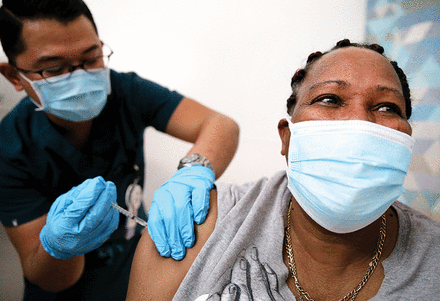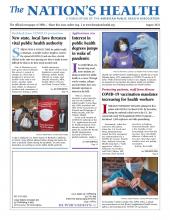
In December, Caitlin Crowley, RN, MPH, MSN, a family nurse practitioner at East Boston Neighborhood Health Center, affixes a pin boasting of her COVID-19 vaccination.
Photo by Joseph Prezioso, courtesy AFP/Getty Images
Indiana University Health admitted its first patient with COVID-19 in March 2020. By December, during the outbreak’s third wave in the U.S., the system had nearly 500 hospitalized COVID-19 patients — and almost 1,200 employees out while quarantining.
Fortunately, relief also arrived in December, when the U.S. Food and Drug Administration issued the first emergency use authorization for a COVID-19 vaccine. Shortly after, Indiana University Health launched a “fairly aggressive” effort to immunize its workers, said Paul Calkins, MD, associate chief medical executive at Indiana University Health. After a few months, it was increasingly clear that the vaccines were incredibly effective, Calkins said. It was also clear that many workers were not getting vaccinated.
In June, the health system issued a new directive that all staff must be vaccinated against COVID-19 by Sept. 1 as a condition of employment. About 69% of its 36,000 employees were fully vaccinated as of lateJune, Calkins reported. As expected, the requirement is drawing protest — just as the system’s flu vaccination requirement did in 2012 — but he said the backlash to COVID-19 vaccination has been much worse.
“If we want to get back to near-normal operations, we have to deal with the problem and vaccination is the way to deal with it,” Calkins told The Nation’s Health. “There’s one definitive thing that works and that’s vaccination.”

Health care worker Karen Crawford gives a thumbs-up as nurse Yolanda Javier, LVN, administers a COVID-19 vaccine at St. John‘s Well Child & Family Center in Los Angeles in January. As demand for vaccinations has ebbed, health care facilities and systems are instituting mandates for health workers.
Photo by Irfan Khan, courtesy Los Angeles Times via Getty Images
Indiana University Health was among the first U.S. hospital systems to announce a COVID-19 vaccine requirement for staff, but more mandates are expected to follow, especially after a COVID-19 vaccine gains full FDA approval. As of early summer, both Moderna and Pfizer had submitted their vaccines to FDA for full review.
A June federal court ruling, which dismissed a lawsuit challenging an employee COVID-19 vaccine requirement at Houston Methodist Hospital in Texas, is also expected to pave the way.
“This is not coercion,” Judge Lynn Hughes said in her ruling. “Methodist is trying to do their business of saving lives without giving them the COVID-19 virus. It is a choice made to keep staff, patients and their families safer.”
James Hodge Jr., JD, director of the Network for Public Health Law’s Western Region Office, said the ruling will not likely stop more lawsuits over the issue, but he predicts such requirements will become more commonplace for the U.S. health workforce. As the pandemic recedes in the U.S. and public health workers can better trace the source of COVID-19 outbreaks, Hodge said having an unvaccinated workforce will quickly become a liability for many employers.
“These vaccine mandates are not put in place to disgruntle employees and create havoc, but to do something that is also legally required: creating a safe workplace,” said Hodge, a professor of law at Arizona State University. “You don’t get to walk away from that responsibility.”
In May, the U.S. Equal Employment Opportunity Commission said businesses are within their legal right to require employees be vaccinated against COVID-19, as long as they are not violating the Americans with Disabilities and Civil Rights acts. At the state level, conservative lawmakers are responding with a flurry of bills that would ban employers from taking such action. In Montana, for example, the governor signed a law in May banning employers from refusing employment based on vaccination status, with exceptions for some health care facilities, such as nursing homes.

A worker at Atria Senior Living in Kennebunk, Maine, shows support for COVID-19 vaccines at a January immunization event. As of June, more than two-thirds of Maine’s nursing home staff were fully vaccinated, according to state health officials.
Photo by Derek Davis, courtesy Portland Press Herald/Getty Images
“This certainly isn’t the end of the story,” Hodge told The Nation’s Health. “Even though the EEOC made it very clear that employers can do this, I think we’ll see lawsuits like the one in Houston continue to proliferate.”
Vaccine mandates are getting a lot of politicized attention, but the reality is they are hardly new, especially among health care workers. Most U.S. hospitals require workers get a flu vaccine, with the percentage of non-Veterans Affairs hospitals adopting a flu shot mandate increasing from 44% in 2013 to almost 70% in 2017, according to a 2018 study. Scientists have long recommended health workers get a variety of vaccines, and research shows the strategy works to protect both workers and their patients.
However, just like the general population, vaccine hesitancy can be a barrier among health care workers. A national survey of health workers found that just over half of those on the front lines had received at least one dose of a COVID-19 vaccine as of early March.
Conducted by the Kaiser Family Foundation and The Washington Post, the survey found about 80% of clinicians responsible for patient diagnosis and treatment had received a vaccination, compared to about 44% of administrative workers and 37% of those who assist with personal care of patients, such as bathing and eating. Among health workers who had not received the vacccine, potential side effects, safety and newness of the vaccines were cited as reasons for hesitancy.
That mistrust is being repeated at the local level across the country.
In February, University of Michigan researchers surveyed over 11,300 employees at an academic health care center in the state that began vaccinating its workers in December. The results, released in April as a preprint, found nearly 85% of the workers had been vaccinated, were scheduled to or planned to as soon as possible. But over 11% were delaying vaccination and more than 29% had at least one concern about COVID-19 vaccines.
Abram Wagner, PhD, MPH, one of the researchers and a research assistant professor at the university, said even among vaccinated workers, a large number still had some concerns about possible unknowns, “and that’s normal.” But among those who did not plan to get vaccinated, a major issue was distrust in the agencies and companies involved in the vaccines’ development, which he said is much harder to address.

Lorraine Harvey, an in-home health care worker, receives her first dose of the COVID-19 vaccine from nurse Rudolfo Garcia, RN, at a clinic at Martin Luther King Jr. Community Hospital in Los Angeles in February.
Photo by Mario Tama, courtesy Getty Images
“For health care workers who say they don’t want it at all — which was very low — it will be hard to reach them,” Wagner told The Nation’s Health. “But people do change their minds.”
In the nation’s capital, the D.C. Hospital Association is working with the city’s hospitals to engage with and educate health workers about the COVID-19 vaccine before requirements kick in, said Jacqueline Bowens, MS, the association’s president and CEO.
In June, the association released a consensus statement from D.C.’s 14 hospitals and health systems agreeing to mandate COVID-19 vaccination for staff, with each setting its own date after which vaccination will be a condition of employment. About 70% of D.C. hospital employees were fully vaccinated as of June.
Bowens said it was not an easy consensus to come to, “but the science is really what drove the process.” She noted that the majority of D.C. hospitals already require that staff receive other vaccines, such as the flu shot.
“We don’t want this to be seen as punitive, and we know a big chunk of our job now is to meet people where they are on this,” Bowens told The Nation’s Health. “We have to do it without judgment and make sure people understand that the science is telling us that the vaccine is our best tool against COVID-19.”
Calkins, at Indiana University Health, said it could be some time before Indiana reaches high levels of vaccination. As of late June, the state’s COVID-19 vaccination rate was below 50% and the pace was slowing. The result, of course, means too many people remain susceptible to COVID-19.
“There’s real concern that come fall there might be another COVID-19 surge and we need our people to be ready for that,” he said. “We need to provide an example for our community and protect the people we care for.”
For more information on health worker COVID-19 vaccine requirements, visit www.kff.org. For a Centers for Disease Control and Prevention toolkit with resources for building vaccine confidence among health personnel, visit bit.ly/workertools.
- Copyright The Nation’s Health, American Public Health Association









